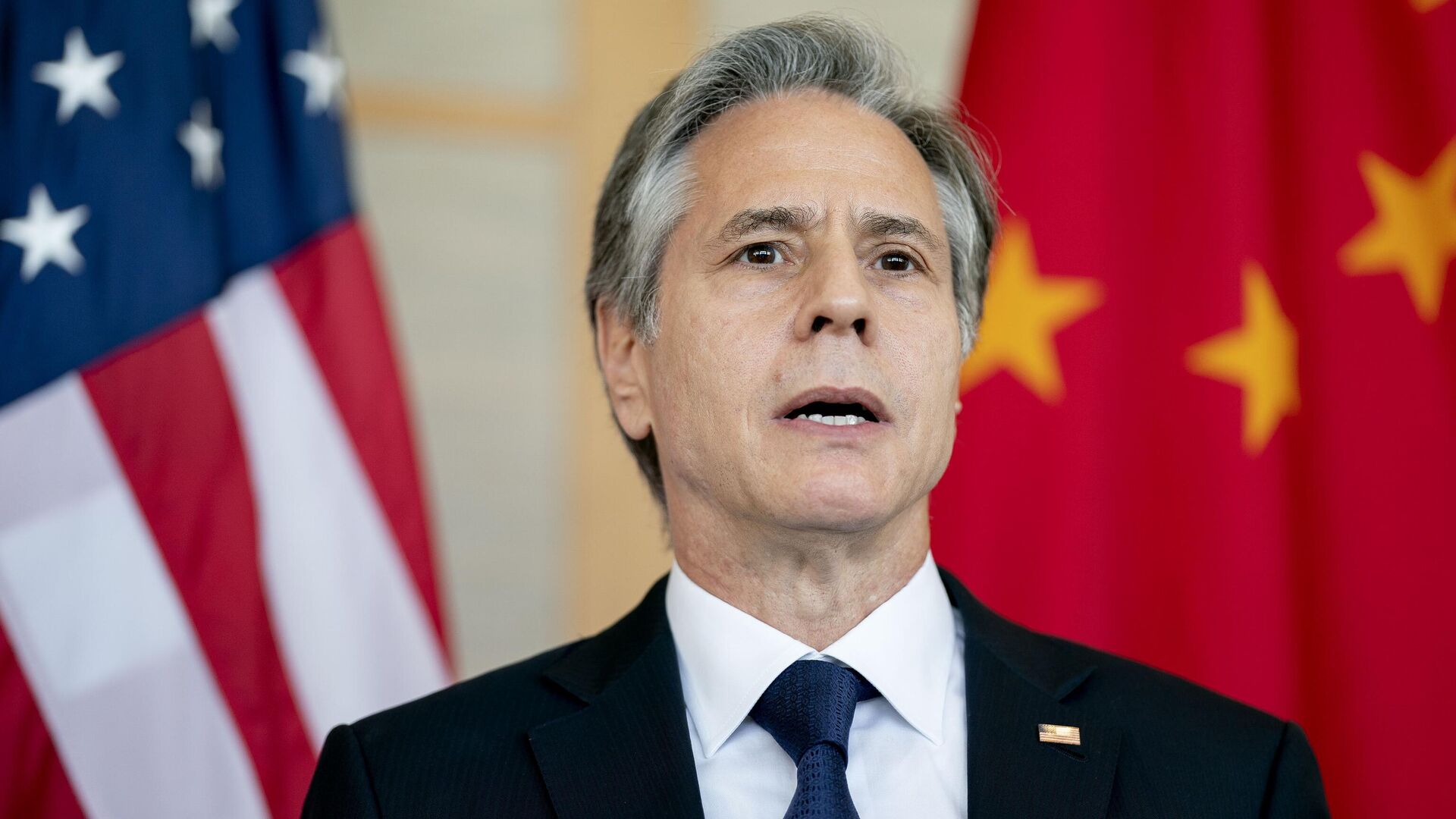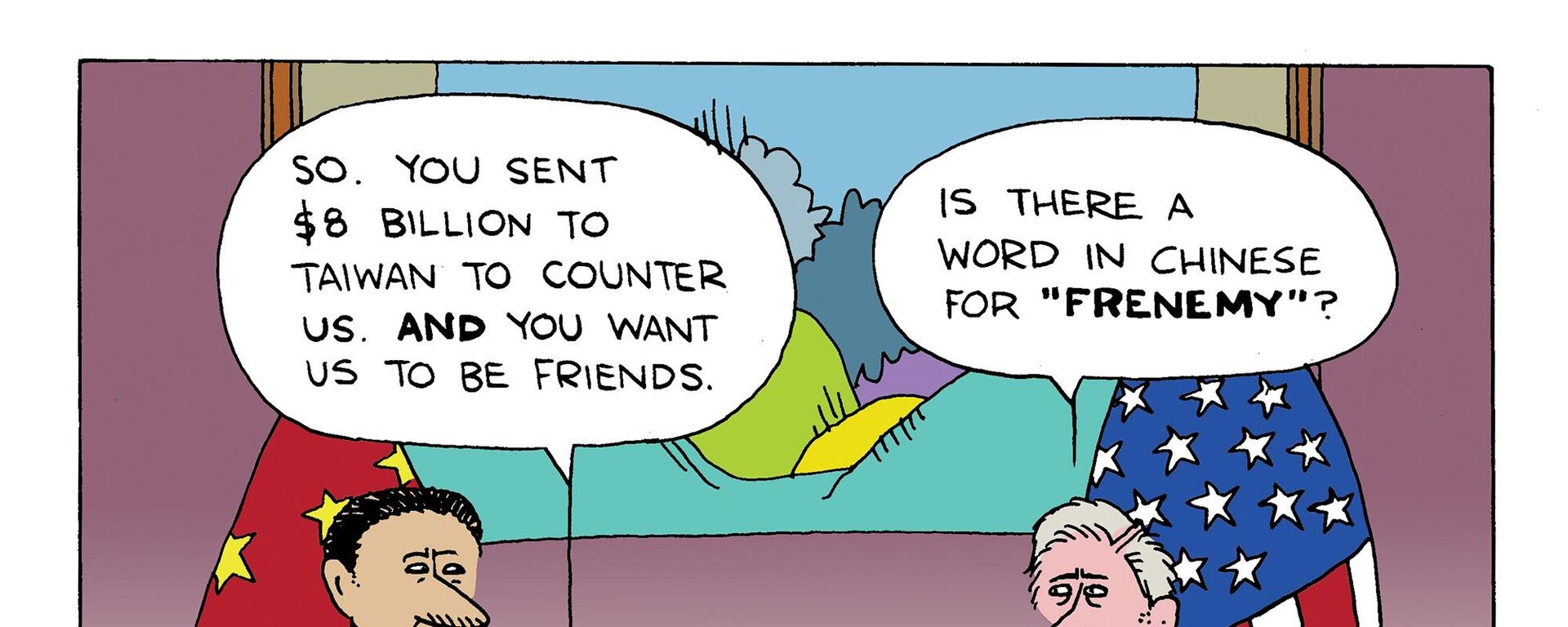https://sputnikglobe.com/20240427/a-bluff-us-tries-to-cut-ties-between-china--russia-spearhead-economic-decisions-for-china-1118138057.html
‘A Bluff’: US Tries to Cut Ties Between China & Russia, Spearhead Economic Decisions for China
‘A Bluff’: US Tries to Cut Ties Between China & Russia, Spearhead Economic Decisions for China
Sputnik International
Xi said the two countries “should be partners rather than adversaries”, and recognized this year as the 45th anniversary of diplomatic relations between the US and China. Xi added that the world is “big enough” to accommodate “the simultaneous development and prosperity of both China and the US”.
2024-04-27T06:10+0000
2024-04-27T06:10+0000
2024-04-27T06:10+0000
world
china
us-china relations
us
antony blinken
russia
joe biden
linwood tauheed
xi jinping
us hegemony
https://cdn1.img.sputnikglobe.com/img/07e8/04/1b/1118138408_0:0:3071:1728_1920x0_80_0_0_5ee33b5e433ae47f00ddddc0e70778a4.jpg
On Friday, US Secretary of State Antony Blinken met with Chinese President Xi Jinping. The meeting came after a three-day visit to China that was reportedly hijacked by contentious issues between the two countries, with China even warning Blinken of a “downward spiral” in their relations.Blinken also said that the US did not aim to hold China’s development or separate the world’s two largest economies, and that the US wants China’s economy to grow but the “way” it grows “matters”. The secretary of state cited what the US has called “unfair trade practices” by China and the possibility of the US and other markets being flooded with Chinese products.Linwood Tauheed, an Associate Professor of Economics at the University of Missouri-Kansas City, sat down with Sputnik’s The Critical Hour to discuss the “downward spiral” of US-China relations.“What's interesting is that the standard economic theory that the West says it adheres to always comes out with an idea that when two countries trade, they can both win. That it's not a win-lose situation, that it's a win-win situation,” said Tauheed. “However, the US, apparently, and the West in general, is concerned about China winning.”Sputnik’s Garland Nixon suggested that the US is searching for a pretext which they may use to sanction China. During US Secretary of State Antony Blinken’s visit to China, Blinken made a groundless accusation against China of being Russia’s “top supplier” for their defense industrial base as the US continues its support of Ukraine in a proxy war with Russia.A New York based newspaper recently reported that the US is “drafting sanctions that threaten to cut some Chinese banks off from the global financial system” which they hope will pressure Beijing to stop its commercial support of Russia’s military production.“So they're not going to separate, they're joined strategically. And because of the things we said before about these sanctions being bad for business, Xi has no reason to think of this as a real plan. There are no real plans that can work. So, Xi can only lose if he believes the threat and doesn't take it as a fake out. I think because Moscow and Beijing are joined strategically, I can't see Xi going for this fake.”A recent analysis from Xinhua news claims that China’s economic recovery has “gathered steam in the first quarter of 2024, displaying strength and resilience and bringing much-needed certainty to an otherwise uncertain global economic landscape”. The analysis also found that the Chinese economy is shifting from “rapid growth” to “high-quality development”.“If you just concentrate on growth and just producing more and more products, your production infrastructure becomes old. Bridges start to fall down. You find your workforce is not competitive and eventually that will catch up with you,” Tauheed explained.During Blinken’s trip to China, the secretary and Xi also discussed next steps regarding a range of commitments that Xi and President Joe Biden made at their summit in California in November. Those include advancing cooperation on counternarcotics, military-to-military communication, talks on artificial intelligence risks and safety, and people to people exchanges, according to a State Department readout.
https://sputnikglobe.com/20240427/case-of-frenemies--1118136179.html
https://sputnikglobe.com/20240426/us-sows-chaos-in-asia-pacific-foments-serious-problems-in-the-region-1118130411.html
china
russia
Sputnik International
feedback@sputniknews.com
+74956456601
MIA „Rossiya Segodnya“
2024
News
en_EN
Sputnik International
feedback@sputniknews.com
+74956456601
MIA „Rossiya Segodnya“
Sputnik International
feedback@sputniknews.com
+74956456601
MIA „Rossiya Segodnya“
russia china us, us-china relations, russia vs nato, ukraine in nato, no nato for ukraine, ukraine's nato membership bid, us hegemony, us dominance, us arrogance, multipolar world order, new world order, us expansionism, taiwan problem, taiwan issue, taiwanese independence, independent taiwan, multipolar world, polycentric world, russia-china alliance, china-russia alliance
russia china us, us-china relations, russia vs nato, ukraine in nato, no nato for ukraine, ukraine's nato membership bid, us hegemony, us dominance, us arrogance, multipolar world order, new world order, us expansionism, taiwan problem, taiwan issue, taiwanese independence, independent taiwan, multipolar world, polycentric world, russia-china alliance, china-russia alliance
‘A Bluff’: US Tries to Cut Ties Between China & Russia, Spearhead Economic Decisions for China
Xi said the two countries “should be partners rather than adversaries”, and recognized this year as the 45th anniversary of diplomatic relations between the US and China. Xi added that the world is “big enough” to accommodate “the simultaneous development and prosperity of both China and the US”.
On
Friday, US Secretary of State Antony Blinken met with Chinese President Xi Jinping. The meeting came after a three-day visit to China that was reportedly hijacked by contentious issues between the two countries, with China even warning Blinken of a “downward spiral” in their relations.
Blinken also said that the US did not aim to hold China’s development or separate the world’s two largest economies, and that the US wants China’s economy to grow but the “way” it grows “matters”. The secretary of state cited what the US has called “unfair trade practices” by China and the possibility of the US and other markets being flooded with Chinese products.
Linwood Tauheed, an Associate Professor of Economics at the University of Missouri-Kansas City, sat down with Sputnik’s The Critical Hour to discuss the “downward spiral” of US-China relations. “What's interesting is that the standard economic theory that the West says it adheres to always comes out with an idea that when two countries trade, they can both win. That it's not a win-lose situation, that it's a win-win situation,” said Tauheed. “However, the US, apparently, and the West in general, is concerned about China winning.”
“That must mean that they are also concerned about the West losing, and they are seeing this happening, because the West, of course, is doing things like engaging in sanctions and stealing other countries' sovereign wealth funds and so forth,” he added. “Those are not things that are supposed to be happening when you're trying to create a win-win situation. Blinken is in effect acting as the hegemon, as the bully on the block, and Xi is apparently not having the bullying.”
Sputnik’s Garland Nixon suggested that the US is searching for a pretext which they may use to sanction China. During US Secretary of State Antony Blinken’s visit to China, Blinken made a groundless accusation against China of being Russia’s “top supplier” for their defense industrial base as the US continues its support of Ukraine in a proxy war with Russia.
“Blinken also sees [this] position as a bluff. You'll also remember that at the end of a meeting, Biden stood up at a speech and called Xi a dictator. And the look on Blinken's face was, ‘oh, I told him not to do that, but here we go again’. Blinken is acting as a dutiful secretary of state,” said the economic professor. “But Blinken also knows that this is a bad move. And so, you know, this is definitely a bluff, and it's a bluff that the US cannot carry on.”
A New York based
newspaper recently reported that the US is “drafting sanctions that threaten to cut some Chinese banks off from the global financial system” which they hope will pressure Beijing to stop its commercial support of Russia’s military production.
“Beijing and Moscow are joined strategically. They continue to say to the West that they cannot be separated. And they understand that if they are separated, then divided they will fall. That if they don't support each other, then they give the West, particularly the US, the opportunity and the power to destroy them individually,” said Tauheed.
“So they're not going to separate, they're joined strategically. And because of the things we said before about these sanctions being bad for business, Xi has no reason to think of this as a real plan. There are no real plans that can work. So, Xi can only lose if he believes the threat and doesn't take it as a fake out. I think because Moscow and Beijing are joined strategically, I can't see Xi going for this fake.”
“The Biden administration is desperate for some kind of win, and it's just flailing around in places that it thinks it might be able to win. You know, Biden wants to be able to win with Russia in Ukraine. That war is going badly, and even the mainstream media is admitting that it's going badly,” the professor added. “Should things collapse there before the November election, then Biden, of course, will be seen as the cause of that failure.”
A recent
analysis from Xinhua news claims that China’s economic recovery has “gathered steam in the first quarter of 2024, displaying strength and resilience and bringing much-needed certainty to an otherwise uncertain global economic landscape”. The analysis also found that the Chinese economy is shifting from “rapid growth” to “high-quality development”.
“Yes, the Chinese economy is growing over 5%. Now, that's down from pre-pandemic, when the Chinese economy was growing at 8%,” said Tauheed. “But, essentially all economies are recovering from the pandemic, but 5% is much higher than the 2% or 3% that the US is growing at.”
“If you just concentrate on growth and just producing more and more products, your production infrastructure becomes old. Bridges start to fall down. You find your workforce is not competitive and eventually that will catch up with you,” Tauheed explained.
“So, what China is doing is saying, ‘okay, we've grown quite a bit, now, what we need to do is to put in place the infrastructure, the labor force, the technical infrastructure, so that we can continue to grow into the future and we won't hit stagnation’,” he added. “The Chinese government is moving from growth to development, the US economy is still in growth while its infrastructure is falling apart.”
During Blinken’s trip to China, the secretary and Xi also discussed next steps regarding a range of commitments that Xi and President Joe Biden made at their summit in California in November. Those include advancing cooperation on counternarcotics, military-to-military communication, talks on artificial intelligence risks and safety, and people to people exchanges, according to a State Department readout.




